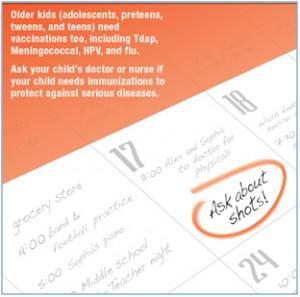 Once one of the most feared contagious illnesses among college students and the military, the incidence of bacterial meningitis due to the Neisseria meningitidis strain has dropped significantly since the introduction of the Menactra meningitis vaccine (MCV4) in 2005. The American College Health Association, the Centers for Disease Control and Prevention (CDC) and the American Academy of Pediatrics now strongly recommend that all children under the age of 19 receive the Menactra vaccine according to the following schedule:
Once one of the most feared contagious illnesses among college students and the military, the incidence of bacterial meningitis due to the Neisseria meningitidis strain has dropped significantly since the introduction of the Menactra meningitis vaccine (MCV4) in 2005. The American College Health Association, the Centers for Disease Control and Prevention (CDC) and the American Academy of Pediatrics now strongly recommend that all children under the age of 19 receive the Menactra vaccine according to the following schedule:
- 11 to 15 year-olds should be vaccinated routinely with a booster dose given at 16-18 years of age.
- Those 15 years old and higher receiving the vaccine for the first time do not need a booster dose.
Bacterial meningitis may also be caused by other bacterial strains such as Haemophilis and Pneumococcus. The Haemophilis vaccine (Hib), which has been available for over thirty years and is routinely given to infants, confers reasonable protection against this form of meningitis, while the efficacy of the pneumococcal vaccine (PCV7) in preventing meningitis is less clear.
Nonetheless, the untimely death of two study abroad students last week is a sober reminder that bacterial meningitis still occurs. Symptoms of bacterial meningitis include fever, severe headache, neck stiffness, nausea and vomiting, rash, and in severe cases confusion and seizures. The diagnosis is made by examining fluid removed from the spinal canal (spinal tap), while early treatment with the appropriate intravenous antibiotics is essential to avoid long term sequela or death. Anyone who is experiencing any combination of these symptoms should seek medical care immediately, and anyone who has not received the HIB and Menactra vaccines according to the recommended schedule (including boosters), should make sure these immunizations are made current prior to travel.
Bacterial meningitis is spread by kissing, sharing utensils and drinking glasses, living in close quarters such as a dormitory or summer camp, and smoking or being exposed to smoke. Being run down, stressed and/or fatigued also increases the risk of infection. Although not as contagious as the common cold, the mechanism of spread is similar. Those who have been exposed, and are not properly immunized, may need prophylactic antibiotics such as rifampin or ciprofloxacin after consultation with a medical professional.
Meningitis may also be caused by viruses and other pathogens such as fungi, protozoa and tuberculosis. Viral meningitis is common, but the symptoms are not as severe and usually require only supportive treatment. Viral meningitis rarely has any long term effects. Other types of meningitis are much less common and generally attack only those who are immunocompromised by AIDs or chemotherapy.
Although there are certain parts of the world, such as the “meningitis belt” of sub Saharan Africa, where bacterial strains that can cause meningitis are commonly found, no part of our planet is free from risk. HTH Worldwide encourages all travelers to make sure they are properly immunized against bacterial meningitis, and to seek medical help immediately for suspicious symptoms or for known exposure to someone who has been diagnosed with bacterial meningitis.

